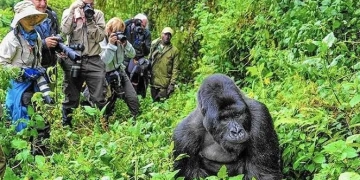The Silverback gorilla, named Rafiki, was killed in the Bwindi Impenetrable National Park after going missing on June 1. His body was found the next day.
One of Uganda’s best known mountain gorillas, silverback Rafiki, was killed by poachers and conservationists are raising red flag— calling for equivalent and matching sentencing from the law and asking the judiciary to expeditiously look into this case and conclude it very well in the interest of conservation.
David Duli, the Country Director of WWF in statement on Monday June 1 said Gorillas play an important role in their environment.
“Without these large-scale grazers eating lots of vegetation, the natural balance in the food chain would be disrupted. This could negatively affect other wildlife in the area, and ultimately the people who depend on that environment for food, water and other resources,” he said.
There are just over 1,000 mountain gorillas in existence and the Uganda Wildlife Authority (UWA) described Rafiki’s death as a “very big blow”.
Martin Asiimwe, the Coordinator of the Forests and Wildlife Program at WWF in Uganda stated that the news from Bwindi was devastating.
One of those arrested confessed to killing the gorilla in self-defence.
Investigations showed that silverback Gorilla Rafiki was killed by a sharp object that penetrated his internal organs.
Four men have been arrested, and they face a life sentence or a fine of $5.4m (£4.3m) if found guilty of killing an endangered species.
The silverback Gorilla Rafiki, believed to be around 25-years-old when he was killed in the Bwindi Impenetrable National Park, was the leader of a group of 17 mountain gorilla.
Both WWF and UWA collaborate that Rafiki, the silver back of Nkuringo gorilla group was reported missing in the group and on June 2nd, 2020.
A search was mounted and the body found in Hakato area inside BINP.
Nkuringo Gorilla group was the first gorilla group to be habituated in the southern sector of BINP in 1997.
At the time of Rafiki’s death, the group had 17 members; 1 Silverback, 3 Blackbacks, 8 Adult females, 2 Juveniles, and 3 infants.
Although habituated, wild gorillas can still come into conflict with humans when they feel threatened.
MUST READ: Prof. Rwebiita writes missive to Museveni: Decision not to reopen schools may do more harm than good
Tourists are largely drawn to the park by its estimated 400 mountain gorillas – roughly half the world’s population and each habituated mountain gorilla according to WWF is estimated to generate $1 million per year in tourist dollars for the Ugandan economy.
A recent census puts the number of mountain gorillas to over 1000 in Uganda, Rwanda and Democratic Republic of Congo.
State-run WWF supported by WWF have been working with district governments, local leaders and community members to combat poaching and other illegal activities.
WWF supports the work of IGCP in the communities around Bwindi and other mountain gorilla habitats to reduce conflict between wildlife and people.
Law enforcement and government protection tends to be more robust for mountain gorillas than for their western lowland gorilla cousins, who are also critically endangered and suffering rapid declines from poaching. Gorilla meat has become popular among wealthy elites in Central African cities.
“While poachers that kill even one legally protected animal are often held to account in mountain gorilla range, poachers can often bribe their way to freedom” added David.










Discussion about this post